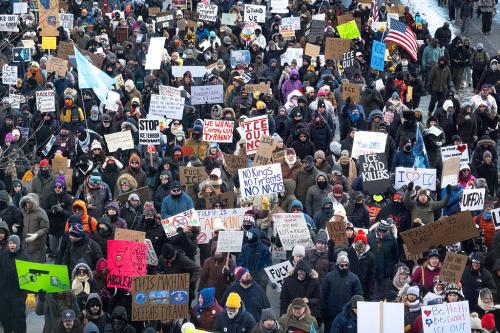South Africa’s fifth universal franchise election, which is set for May 7, seems on the surface to be a mundane affair. The governing African National Congress (ANC) has won all national elections since democracy was established in 1999 and is again expected to win at least 60 percent of the vote this time around. But underneath that headline result, this year’s election could begin to change the country’s future.
It is now 20 years since white minority rule gave way to full democracy. While much has changed, the burden of the past endures—for good and ill. Multi-party democracy—enjoyed only by whites before 1994—flourishes today, but so does the legacy of racial oligarchy. Poverty is deep, inequality is the highest in the world, and racial divisions are patent. This election may test the health of South Africa’s democracy—and could trigger the most serious attempt yet to negotiate a way out of the economic patterns of the past.
Because post-election results in the past have been accepted by all parties, society’s capacity for fair electoral contests has hardly been tested. The ANC has won every national ballot since the end of apartheid with at least 62 percent of the vote. It controls eight of the nine provincial governments: In 2009, in the Western Cape province, the ANC accepted defeat for the first time by the largest opposition party, the Democratic Alliance (DA), but its hold on national power has never been threatened.
This trend highlights a deeper reality: Despite much activity by a wide array of parties, fierce electoral competition is only now beginning.
The ANC’s history as leader of the fight against apartheid has assured it overwhelming support from black voters. But it is not the only party that relies on deep voter loyalty. South African voter preferences are shaped by identity—chiefly race and language, although other identities play a role too. Because identity still coincides with area of residence (white rule segregated residential areas by race, and the effect has only been partly eroded), parties tend to monopolize local fiefdoms. The ANC controls the overwhelmingly black areas, the DA the affluent suburbs, and other parties have local strongholds. Opponents have tended not to challenge these bastions, and so there are few areas of the country in which parties vigorously compete.
This situation partly began to change in 2009, when the ANC faced active opposition from a breakaway party, the Congress of the People, and also campaigned actively on the home turf of the Inkatha Freedom Party, a party that is a vehicle for tribal traditionalists. But this year’s election is more competitive still.
The ANC is more vulnerable than ever before. Many of its supporters are unhappy with its leadership. They point to conspicuous consumption by much of the political elite and constant allegations of corruption against politicians as evidence that politicians care about themselves, not voters. Feuding within the party has weakened its capacity to get out the vote. (This too is a symptom of continued racial inequality: Politics are used to fight for money and status, which is still not available to most black people in the private sector.)
Opposition parties have sensed potential ANC weakness and are actively competing with it. The DA has been campaigning in ANC areas, and the ANC faces another breakaway bloc, the Economic Freedom Fighters (EFF), established last year by ANC Youth League leaders that it had expelled. While the EFF’s strength is grossly exaggerated by a media desperate for an uncertain election outcome, it is a noisy presence in ANC areas.
These signs of apparent ANC weakness have created expectations of a watershed election. Certainly, the campaign has been the most ill-tempered yet. There is little debate on issues—the opposition parties brand the ANC as corrupt and inept, while it labels them holdovers from a racially divided past. The parties spend more time yelling at each other than talking to voters.
But expectations of a sea change are likely to be disappointed. Political debate in society is the preserve of about 30 percent of the country—roughly the percentage of citizens whose views are reflected in the influential media. Among those who are connected to the national debate—those who belong to connected organizations and whose views are conveyed through social and mainstream media—rejection of the ANC is widespread. But, outside that inner circle, the ANC’s roots in the electorate are deep. Helen Zille, leader of the DA, has acknowledged that she expects the ANC to win 60 percent of the vote: Since she has access to reliable polls, and South African parties tend to talk their prospects up, the ANC seems likely to win at least that. While this number would be a come down from the 66 percent it won last time, it is hardly terminal. The EFF, whose strident racial nationalism sparks deep white fears of a black uprising, may become the third-biggest party, but it polls so far behind the DA it will likely be relegated to a bit player: The DA is expected to win at least 25 percent; the EFF’s support is unlikely to top 5 percent.
Fears that the country will lapse into authoritarianism when the ANC is challenged are probably exaggerated. Safeguards against vote rigging are fairly strong, and fears in the 2009 election that heightened competition would produce severe conflict were largely unfounded. This time, there have been attempts to bully opposition parties on university campuses, but the integrity of the process is not in doubt. It will take at least another election before competition becomes heated enough to test the depth of the society’s commitment to electoral democracy.
Nevertheless, the ANC is more worried about losing votes than ever before and so, for the first time since 1994, is making a serious effort to persuade doubting voters to support it. One response has been to begin to truly address the quality of government services for the poor, who are its major constituents. One of many signs that change is a far slower process than revolutionaries hope and conservatives fear is that the mostly white suburbs continue to enjoy better government services while areas that vote ANC are ignored. But now there is an incentive for the ANC to take voters more seriously.
Its second response has been to address poverty and inequality—its leadership believes that slow progress in tackling both is the cause of voter disaffection. The ANC has, therefore, been talking of the need for radical economic change. However, it has proposed few concrete changes because it knows that it cannot impose change on the (largely white) owners of capital without damaging the economy. So it is forced to face the society’s key challenge: addressing the inequities created by the legacy of white domination without damaging the economy moving forward. This challenge can only be met through negotiation.
A sign that reduced voter support has prompted the ANC to seek serious negotiations on the economy with businesses, labor unions and professional associations is its election manifesto. This agenda, for the first time, sets out in detail some of the economic changes the ANC wants to enact. The ANC’s manifesto also proposes business-friendly reforms. The ANC is telling business what it wants—and what changes it is willing to offer it in return. The details are unimportant: The key point is that it is staking out a bargaining position and so is signaling that it wants to negotiate economic change.
How serious the ANC is about governance reform and economic negotiation will depend in some measure on the election result: If the ANC does lose ground, the pressure to win back votes may impel it in this direction. If it doesn’t, complacency may set in.
A seemingly trivial shift in voter allegiance could therefore prompt the beginnings of a negotiation process. This trend could change the historical economic patterns that threaten the new democracy’s progress.
Note: This blog reflects the views of the author only and does not reflect the views of the Africa Growth Initiative.
The Brookings Institution is committed to quality, independence, and impact.
We are supported by a diverse array of funders. In line with our values and policies, each Brookings publication represents the sole views of its author(s).




Commentary
South Africa’s Election: Same Result, New Future?
May 5, 2014